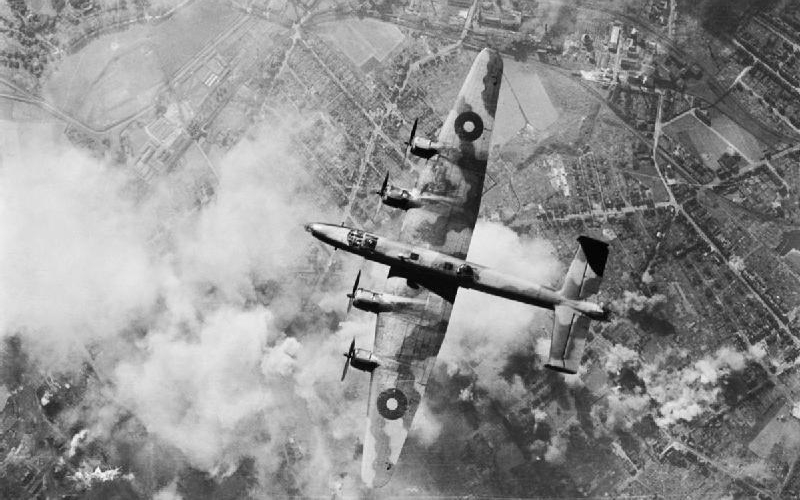(W)Archives: Aerial Bombardment and Hitting the Broad Side of a Barn

With the U.S.-led campaign against the Islamic State in Iraq and the Levant (ISIL) and the Saudi-led operations against Houthi rebels in Yemen, bombing campaigns are on our minds these days. What better time to look at one of the most important and dramatic documents in the history of airpower: the inauspiciously named “Butt Report.” This document was declassified more than fifty years ago but has only recently become readily accessible (in transcribed form) through “Ether Wave Propaganda,” a blog site devoted to the “history and historiography of science.”
The Butt Report was undertaken in the summer of 1941 by David Bensusan Butt at the order of an aide to British Prime Minister Winston Churchill. Issued on 18 August 1941, it investigated the effectiveness of the British night time bombing campaign against German targets in France and Germany. Its conclusions were far from encouraging and helped lead to a major change in British bombing doctrine that had profound effects.
In the early months of World War II, the Royal Air Force’s (RAF) Bomber Command launched a number of daytime bombing raids against German targets but found that their own losses were alarming, as high as 50%. Air Marshal Edgar Ludlow-Hewitt, the head of Bomber Command, realized that the psychological effects of continuing such raids would be profound. Furthermore, he calculated that continuing such raids would lead to the deaths of skilled air crews who would otherwise be able to fly better bombers that would eventually be brought into the force.
Also early in the war, Bomber Command started launching night-time propaganda leaflet drops over Germany. Aircrews found it extraordinarily difficult to navigate in the dark and frequently overflew or even crash-landed in still-neutral Denmark, the Netherlands, and Belgium. However, they also ran across very few German fighters and discovered that German anti-aircraft defenses were largely ineffective against them.
With these data points in hand, debate ensued over how to craft a successful bombing campaign against Germany. Ultimately, the debate was won by Churchill, who remembered that World War I had been won in large part because of economic pressure on Germany. Lacking other ideas for how to defeat Germany, Churchill and his allies proposed that an air campaign against German economic targets primarily conducted at night would cripple German war making capacity and also somehow damage German civilian morale. They ignored the fact that nobody quite knew what damaging German morale meant or how it would contribute to victory. They also conveniently overlooked the fact British morale seemed to have been enhanced by the Blitz. When the new approach was tried, initial reports from debriefings of air crews seemed encouraging. Bombers were successfully carrying out their missions.
Thus the Butt Report came as a rude shock when it looked at Bomber Command sorties flown in June and July 1941 and concluded on the basis of photographic evidence that “of those aircraft recorded as attacking their target, only one in three got within five miles.” It further concluded that the best accuracy came in attacking German targets in France but targets farther away in Germany were harder to find. In fact, only one in ten bombers that attacked targets in the German industrial area of the Ruhr got within five miles of their target. The report also showed that the absence of moonlight, and the presence of haze and anti-aircraft fire all had dramatic negative effects on accuracy as well. As if that weren’t enough, Butt noted that these statistics applied only to those aircraft that conducted an attack: a substantial percentage of bombers didn’t conduct attacks at all.
Churchill was appalled and his confidence in airpower was seriously eroded. The RAF started improving navigation and bombing techniques. However, the more profound effect was to shift the conceptual emphasis of the bombing campaign from directly damaging the German economy to eroding German morale. This was done by giving up “precision” raids and instead aiming at “area” targets: German cities. When Air Marshal Arthur “Bomber” Harris took over Bomber Command this became known as “dehousing.” The idea was that German industrial workers could be rendered homeless and if not homeless then they could be kept awake all night by bombing raids and made to live in constant fear for their lives. This, it was hoped, would negatively affect German industrial capacity.
One scholar has pointed to Bomber Command’s Night Area Offensive as being “one of the clear pre-nuclear antecedents of the concept of” Mutually Assured Destruction. Bomber Harris and the scorching air campaign he led have been controversial ever since the war and a source of moral discomfit to many.
We have little data on how the air campaigns against ISIL and the Houthis are going. The British experience, however, provides both a practical lesson and a moral lesson for when things start to go wrong in a war — which they always do to a greater or lesser extent. Practically, it is important to ensure that wartime adaptations make intellectual sense and are grounded in war aims and are not just a search for a nail on which to use the existing hammer. This may be a particularly important point regarding the war in Yemen, given the comparative lack of smart munitions in the inventories of the air forces conducting the campaign against the Houthis. Morally, it is important to ensure that frustration does not lead to moral compromises. Many people today regard Bomber Harris as a war criminal.
Mark Stout is a Senior Editor at War on the Rocks. He is the Director of the MA Program in Global Security Studies and the Graduate Certificate Program in Intelligence at Johns Hopkins University’s School of Arts and Sciences in Washington, D.C.
Author’s note: For further reading on this subject, I highly recommend Tami Davis Biddle’s Rhetoric and Reality in Air Warfare: The Evolution of British and American Ideas about Strategic Bombing, 1914-1945.

